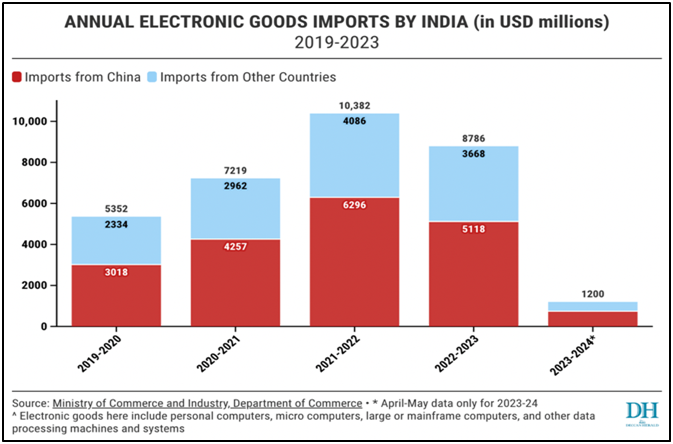Import Management System
05-09-2023
11:24 AM
1 min read

What’s in Today’s Article?
- Why in News?
- Background
- Government’s Plans of Introducing “Import Management System”
- National Security Directive on Telecommunication Sector
- Reasons Behind the Introduction of Import Management System
Why in News?
- On 3rd August, the Union Government had imposed restrictions on import of laptops, tablets and similar electronic goods.
- This import restriction will come into effect from 1st November, 2023.

Background:
- On 3rd August, the Union Government imposed restrictions on import of laptops, tablets, all-in-one personal computers and ultra-small computers and servers with immediate effect.
- However, this decision was later suspended till 1st November, 2023.
- The Directorate General of Foreign Trade (DGFT) had to suspend the implementation as custom officials stationed at ports started holding up shipments of the specified electronic items.
- The issue has also come up in meetings between US and Indian officials after American companies including Apple, Dell, and HP urged the US government to ask Indian government to reconsider its policy.
Government’s Plan to Introduce Import Management System
- The Union government is conducting consultations on a new system through which it aims to monitor the sources from which IT hardware is being imported.
- Through a system known as “Import Management System”, the government will monitor the sources from which IT hardware is being imported.
- After the introduction of this system, finished IT hardware such as laptops, personal computers and servers can only be imported from “trusted geographies”.
- Beyond laptops, personal computers and servers, the directive could be applied on a large range of finished IT hardware equipment including 5G sensors, which are predominantly being imported from China.
- The Import Management System is currently in draft stage. Once finalised, it is expected to replace the licensing requirement.
- There is precedence to this idea of allowing imports only from trusted sources.
National Security Directive on Telecommunication Sector:
- In June 2021, the Central government launched the ‘trusted telecom portal’ and signaled the implementation of the National Security Directive on Telecommunication Sector (NSDTS).
- Under the directive, telecom companies are mandatorily required to connect in their networks only those new devices which are designated as “trusted products” from “trusted sources”.
- Post the 5G spectrum auction last year, operators like Reliance Jio and Bharti Airtel have signed agreements with companies like Ericsson and Samsung, excluding Chinese majors Huawei and ZTE.
Reasons Behind the Introduction of Import Management System:
- China Factor –
- Data released by the Ministry of Commerce and Industry gives us a broad picture of India’s dependence on China with regard to the import of electronic goods such as laptops, computers etc.
- Indeed, India’s imports of the aforementioned class of electronic goods have been steadily rising.
- Whereas in 2019-20, India’s imports of electronic goods stood at $5.3 billion, that figure climbed to $10.3 billion in 2021-22, before declining slightly to hit $8.7 billion in 2022-23.
- Given this fact, a rise in indigenous manufacturing would not only help India reduce its dependence on its diplomatic and business rival but would also help indigenous manufacturers expand their footprint globally.
- The introduction of Import Management System could force IT hardware companies to establish new supply chains, as China is unlikely to be classified as a trusted geography.
- Security Factor –
- Another factor behind the restrictions imposed on this class of electronic goods is concerns about ‘security’.
- The restrictions may have been brought in to guard against electronic hardware coming in with “in-built security loopholes that may potentially endanger sensitive personal and enterprise data”.
- Across the world, many red flags have been raised about cybersecurity with regard to Chinese-manufactured electronics.
Q1) What is the role of DGFT?
This Directorate, with headquarters at New Delhi, is responsible for formulating and implementing the Foreign Trade Policy with the main objective of promoting India's exports. The DGFT also issues scrips/authorization to exporters and monitors their corresponding obligations through a network of 24 regional offices.
Q2) What is the meaning of Anti-Dumping Duty?
Anti-dumping duties are taxes imposed on imported goods in order to compensate for the difference between their export price and their normal value, if dumping causes injury to producers of competing products in the importing country.
Source: Why the Govt is rushing an alternative to its laptop licensing scheme | Indian Express


